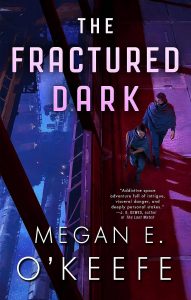Liz Bourke Reviews The Fractured Dark by Megan E. O’Keefe
 The Fractured Dark, Megan E. O’Keefe (Orbit US 978-0-316-29113-2, $18.99, 544pp, tp.) September 2023.
The Fractured Dark, Megan E. O’Keefe (Orbit US 978-0-316-29113-2, $18.99, 544pp, tp.) September 2023.
The Fractured Dark is the second novel in Megan E. O’Keefe’s Devoured Worlds trilogy. The first book, The Blighted Stars, is a fast-paced and viciously readable planetary opera adventure with intelligent fungus, AI descending into dysfunction, ecological critique, explosions, banter, and a touch of inadvisable romance to make the whole cocktail go down more smoothly. I loved the first book. I’m not quite as sure of my enthusiasm for the second.
The Fractured Dark is less well-contained as an individual story, which makes sense for the middle novel of a trilogy. I’m not sure if my more ambivalent feelings about it are a natural consequence of the complexities of it being the middle of the story, before the true climax and cathartic conclusion of the trilogy as a whole, or because of a mismatch between my expectations (as primed by The Blighted Stars) and the reality of The Fractured Dark.
Naira Sharp and Tarquin Mercator have survived the events of The Blighted Stars, though only Tarquin actually remembers all of them. The intelligent and mind-controlling canus fungus, devil’s fruit of the Mercator family’s mining monopoly, exists in a parasitic relationship with current human society. It’s manipulating them, driving them to mine more and more of the metal that humanity uses for its death-cheating body-printing technology and for faster-than-light travel, for this metal is its preferred food source. (It is, along with humanity, also in something of a race-against-time with regard to the shroud, another kind of fungus that is canus’s only predator but that predates on all other vegetal matter, putting food supplies for humanity into something of a crisis.)
Naira doesn’t remember the trials she and Tarquin went through in The Blighted Worlds. While she accepts him as an ally, she’s initially more inclined to see him as a representative of his (cruel) father. This changes slowly over time, but different imperatives and different priorities pull them apart as much as shared goals push them together. Especially when Tarquin’s father and his sister disappear, supposedly departed on a long-term (and politically destabilising) mission to get ahead of Naira’s faction and mine the last two known inhabitable planets (so-called Cradle Worlds). Tarquin is pushed into taking on the leadership of the Mercator family, initially under the thumb of Naira’s obsessive ex-partner, a sadist who may or may not have gone all-in with the intelligent fungus and its plans for propagation. Naira’s still attracted to Tarquin, though – which makes having to abandon him in her ex’s clutches to pursue the elder Mercator into what’s almost certainly a trap all the more difficult.
Tarquin, meanwhile, has to reconcile the fact that the Naira he knew and the one he knows now aren’t quite the same person. And that he knows Naira rather better than this present Naira knows him. In addition to reckoning with his family issues, he has to deal with problems of power, politics and schemes, and the potential end of the entire human species.
Mercator is the most powerful of the six significant families that essentially rule over most of humanity. The heads of those families have, in practice if not in theory, the power of an absolute monarch over their vassals. And most of humanity is either already their vassal (‘‘employee’’) or wants to be. Tarquin wants to be a kinder, less arbitrary ruler than his father, but he’s caught between the blinkers of his privilege and the pressures of his position. Not to mention the mind-controlling fungus problem.
There’s a lot going on in The Fractured Dark. Factional intrigue (there are at least five different factions involved here, all with various different mutual affiliations working at various different cross-purposes, and those are just our heroes’ allies), mind-controlling mould, grand romance, action, espionage, torture, betrayal, family reunions and startling revelations. It’s fast-paced, so it’s all a little hard to keep track of, actually. I’m not at all sure what’s going on, especially with regard to the fungus, by the time we get to the conclusion.
Then again, I’m not exactly the best at following twisty intrigue, however much I enjoy reading it.
I find O’Keefe’s choice to (in a manner of speaking) reset the relationship between Naira and Tarquin to be an interesting one. On one hand, it partly feels like retreading old ground, with similar difficulties in the matter of power, ethics, and responsibility to negotiate. On the other hand, this time Tarquin knows more about Naira than she does about him, which reverses the information disparity of the first novel. And O’Keefe does an engaging line in romance to go along with the explosive action and palace intrigue. Which is important, because the relationship (whether in enmity, respect, or affection) between Tarquin and Naira is the emotional heart of the story so far.
O’Keefe’s characters, even the minor ones, are deftly drawn. The dilemmas her characters face are compelling. And while I might have loved The Fractured Dark less than the trilogy’s first instalment, I still thoroughly enjoyed it. I’m looking forward to the final volume.
Liz Bourke is a cranky queer person who reads books. She holds a Ph.D in Classics from Trinity College, Dublin. Her first book, Sleeping With Monsters, a collection of reviews and criticism, is out now from Aqueduct Press. Find her at her blog, her Patreon, or Twitter. She supports the work of the Irish Refugee Council and the Abortion Rights Campaign.
This review and more like it in the November 2023 issue of Locus.
 While you are here, please take a moment to support Locus with a one-time or recurring donation. We rely on reader donations to keep the magazine and site going, and would like to keep the site paywall free, but WE NEED YOUR FINANCIAL SUPPORT to continue quality coverage of the science fiction and fantasy field.
While you are here, please take a moment to support Locus with a one-time or recurring donation. We rely on reader donations to keep the magazine and site going, and would like to keep the site paywall free, but WE NEED YOUR FINANCIAL SUPPORT to continue quality coverage of the science fiction and fantasy field.
©Locus Magazine. Copyrighted material may not be republished without permission of LSFF.






